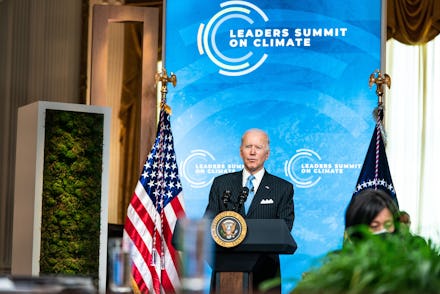Biden's pledges aren't enough to avoid the worst effects of climate change, new study says

As soon as Joe Biden took office as president of the United States, he re-joined the Paris climate agreement. On April 22, he pledged further that the U.S. would reduce its carbon emissions by more than 50% by the end of the decade. While those are steps in the right direction, they won't save the planet — at least not on their own. A new study from Climate Action Tracker, an organization that monitors the effects of climate policies, found that even with the Biden administration's new promises factored in, we are still expected to experience a planetary temperature increase of 2.4 degrees Celsius — nearly a full degree above the Paris Agreement's 1.5 degrees Celsius goal.
Let's start with the good news. Biden's pledge to reduce U.S. greenhouse emissions by 50-52% by the end of the decade has actually put a dent in the expected levels of warming. Assuming the promise is upheld, Climate Action Tracker projects it will stave off 0.2 degrees Celsius of warming. It might not sound like much, but when just 1 degree can be the difference between survival and global systemic collapse, every little bit helps.
The other worthwhile bit of optimism in the study is that there is still room for keeping warming under 2 degrees Celsius. More than one-fourth of the world is still without a clear commitment to reaching net-zero emissions. If they were to join, it's projected that we could keep warming to that 2-degree threshold — above the ideal target of 1.5 degrees, but enough to hold off some of the worst possible outcomes of climate change.
Given that the good news amounts to, "if everything goes right, we might be able to achieve the worst available acceptable outcome," you can probably surmise what the bad news is. Even with the U.S., the world's second-largest contributor of carbon emissions, committing to a massive reduction by next decade and achieving net-zero by 2050, the planet is still going to keep getting warmer. With 131 countries currently promising to reach net-zero by mid-century and 73% of global greenhouse gas emissions accounted for, we're still set to see nearly 1 degree more warming than we set out to achieve. Making matters worse is the fact that our path to keeping global warming at or below the 1.5-degree level targeted by the Paris Agreement is getting narrower. Climate Action Tracker projects just 11-14% odds that we hold warming to that level.
So what gives? Well, countries like Australia, Mexico, Brazil, Russia, Indonesia, Turkey, and Saudi Arabia have either failed to submit new pledges for the Paris Agreement or actually made promises that were less ambitious than their original promises made in 2015. Accounting for current policies rather than promises also leaves a lot to be desired. Climate Action Tracker projects we'll see a global temperature rise of 2.9 degrees Celsius if countries don't tighten up their actual laws and set these plans in stone, instead of just making lofty pledges with no path to achieving them.
None of this should undermine Biden's pledge to cut U.S. emissions and achieve net-zero by 2050. Those are absolutely necessary benchmarks that much be reached. It's just a good reminder that those promises are actually just the bare minimum. Keeping warming at 1.5 degrees Celsius is going to require swifter and more dramatic action — and a global commitment to those changes. We're not there yet. You can look at the 14% odds and say they are slim, or you can look at them and say, "So you're telling me there's a chance."